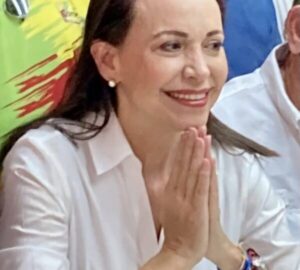For several months leading up to the announcement of the 2025 Nobel Peace Prize, former U.S. President Donald Trump had been vocally asserting that he deserved the award for his diplomatic efforts and foreign policy achievements. Throughout 2024, Trump repeatedly claimed that his work to broker peace deals and end conflicts across the globe made him a leading candidate for this prestigious honor. Despite skepticism from critics and observers, he maintained that his contributions to international relations were unparalleled. Many betting markets and political analysts had even positioned him as a favorite to receive the prize.
However, when the Norwegian Nobel Committee finally revealed their decision, the award went not to Trump, but to María Corina Machado, a Venezuelan opposition leader known for her courageous and relentless fight for democracy in her country. Trump’s public statements throughout the year emphasized his belief that he deserved the Nobel Peace Prize. During a meeting with Israeli leaders earlier in 2024, he lamented, “They will never give me a Nobel Peace Prize. I deserve it, but they will never give it to me.” In speeches that followed, he boasted about his record in international conflicts, declaring, “I’ve done six wars, I’ve ended six wars … I didn’t do any ceasefires,” referring to the various peace deals and diplomatic breakthroughs he claimed to have achieved.
These assertions helped build an image of Trump as a major peacemaker, and many supporters anticipated that he would be recognized accordingly. Yet, when the Nobel Committee’s official announcement came, it was María Corina Machado’s name that was called, a decision that surprised some and pleased others who follow global human rights causes. The Norwegian Nobel Committee released an official statement explaining their choice, stating: “The Norwegian Nobel Committee has decided to award the 2025 #NobelPeacePrize to María Corina Machado for her tireless work promoting democratic rights for the people of Venezuela and for her struggle to achieve a just and peaceful transition from dictatorship to democracy.”
Machado, who initially trained as an engineer before entering politics, has become one of the most outspoken critics of Nicolás Maduro’s authoritarian government. Despite being banned from running for office, facing government persecution, and enduring significant personal risks, she has remained steadfast in her fight for free elections, human rights, and democratic governance in Venezuela. Her relentless advocacy has made her a beacon of hope for many Venezuelans and a symbol of resistance to oppression. The Nobel Prize will likely bring increased international attention and support to her cause, while simultaneously drawing sharp condemnation from Maduro’s regime. The prize ceremony is scheduled for December 10th in Oslo, Norway.

While Machado’s international recognition grows, Donald Trump continues to highlight his own foreign policy initiatives. Recently, he unveiled a new peace plan aimed at resolving the ongoing conflict between Israel and Hamas, claiming it represented a historic breakthrough. Trump stated, “Israel and Hamas have both signed off on the first phase … this is a GREAT day … and we thank the mediators from Qatar, Egypt, and Turkey.” However, despite these positive statements, military operations, including airstrikes, have continued in the region. Analysts caution that the first phase of this plan would still leave significant portions of Gaza under occupation, underscoring the fragile and tentative nature of any peace agreement. Critics argue that the ongoing violence and complex political realities make lasting peace difficult to achieve.
In summary, the 2025 Nobel Peace Prize decision highlights a sharp contrast between María Corina Machado’s brave and persistent efforts for democracy in Venezuela and Donald Trump’s claims to major diplomatic accomplishments. Machado’s victory places renewed international focus on the struggle for freedom and human rights in Venezuela, while casting a spotlight on the limits and controversies of Trump’s foreign policy record. The coming weeks and months will likely reveal how Trump responds to this unexpected snub—whether with grace and humility, anger and defiance, or strategic political maneuvering.





